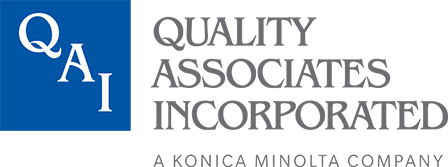Discover How Our Products and Services Can Benefit Your Organization
Securing your sensitive information is an ongoing process – there is no one-time solution. Typically, this process begins with pinpointing exactly which data is considered sensitive and then defining the policies surrounding the management of this information. Which employees should have access to it? Where should it reside? You may also consider encryption software to provide an extra layer of security. QAI’s knowledge of industry and federal regulations, access to best-in-class solutions, and staff members with IT security backgrounds can help keep your organization’s most sensitive information safe.
From paper records in file cabinets, to electronic files on hard drives, the vast amount of information available across the enterprise requires a systematic approach to records management. A records management plan will help you better maintain, store, search for and even expunge your information – no matter its location – so that you can operate more efficiently and cost effectively.
For government agencies, the short answer is “yes.” It is integral to ensure data security for government digital transition. Federal agencies are required to manage their email records in accordance with the Federal Records Act and 36 CFR Chapter XII Sub-chapter B, and many agencies utilize a “Capstone” approach to managing emails. It is integral to ensure data security for government digital transition as well as the private sector. For non-federal organizations, email should still be a part of your plan. The profound amount of emails kept in inboxes, sent folders and even “deleted items” bins not only slows down email servers, but also makes it difficult to meet legal preservation requirements in the event of litigation.
A governance plan is essential for effective, long-term document and content management. It defines what needs to be managed and then lays out the policies and procedures to manage that information. QAI can help you create a plan to clearly define the roles, procedures and processes that will be vital to achieving your data management goals. With a governance plan in place, you can more readily increase your solution adoption rates, ensure compliance across the enterprise, improve information security and uncover hidden cost savings in solution deployment.
Every organization is different, so you will have to examine your existing resources, goals and requirements. Consider your staff’s availability and expertise, budget, and your desired turnaround time. Also, what is the extent of the project? Is the project at the department level or enterprise-wide? If you are looking for back-file conversions, an outside firm can easily tackle the “heavy lifting” portion of the project and set you up with a day-forward solution so that you can make the best use of your staff resources by converting the more easily handled active files at the point of origin in-house.
QAI provides the tools, technology and services to help your organization accurately and effectively capture, manage, store, preserve and deliver content across the enterprise. No matter your business’ size, your volume of documents or formats of content, we guide you through every step of the project and develop a solution. Our document management services include conversion, workflow solutions, advanced forms processing, electronic archiving, collaborative platforms, records storage and retrieval, systems integration and more.
For more than 20 years, QAI has successfully implemented capture, conversion, document digitization services, and content management projects for hundreds of organizations. We draw from a variety of resources – including internal expertise and reputable software and hardware providers – to offer end-to-end solutions, giving you a one-stop shop for all your needs. We provide both onsite support at your location, as well as offsite at our state-of-the-art Client Center located in our headquarters in Fulton, Maryland. We also employ experienced program management personnel with specialized solutions training. Add those factors to our steady growth, proven performance and innovation, and it becomes apparent that you won’t find this level of service anywhere else.
QAI manages a breadth of formats: paper documentation conversion and document digitization services (all size ranges), microfilm, microfiche, microform, aperture cards, VHS and various tapes, maps, photographs, slides, bound books and more.
Intelligent Information Management (IIM) incorporates strategies, methods and tools for capturing, managing, storing, preserving, and delivering content and documents related to organizational processes as part of our digital data storage solutions. When the right people are accessing and collaborating on the right content, the organization is more readily able to achieve its business goals.
Business Process Improvement (BPI) is the methodology of analyzing existing processes and identifying areas in need of streamlining. QAI supports organizations’ BPI efforts by first performing a thorough analysis of “as-is” processes, and then providing the right blend of workflows and technologies to enhance the way they are managing and reporting on information.
Outsourcing your conversion needs to a trusted vendor like QAI eliminates the need to hire, reassign or overburden your staff, and also removes the need to make large capital investments in expensive scanners, software and other equipment.
As a Value-Added Reseller (VAR), QAI partners with today’s leading hardware and software vendors for your digital data storage solutions. We have easy access to any and all of the resources and expertise necessary to help clients achieve their business goals. Also, we are able to offer enhanced customer service, in addition to solutions at a cost-effective rate.
QAI’s experts are well-versed in the compliance requirements of an array of industries. We can review your existing records management processes for compliance-focused data management and records management to ensure that you are meeting even the most stringent regulations.
PII, or Personally Identifiable Information, refers to data that could potentially identify a specific individual. Although PII can be sensitive or non-sensitive, sensitive PII must be encrypted when data is in transit and in rest.



